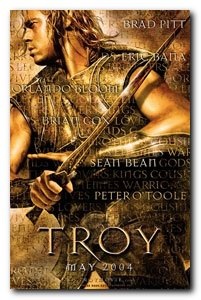 Troy (2004). While blogging about John Woo’s Red Cliff the other day, my mind ventured into a similar retelling of an ancient story of war, tragedy and love: The Trojan War. I dug out my blu-ray edition of Wolfgang Petersen’s Troy: Director’s Cut and re-watched it over two nights – the film runs for 3 hrs 15 minutes.
Troy (2004). While blogging about John Woo’s Red Cliff the other day, my mind ventured into a similar retelling of an ancient story of war, tragedy and love: The Trojan War. I dug out my blu-ray edition of Wolfgang Petersen’s Troy: Director’s Cut and re-watched it over two nights – the film runs for 3 hrs 15 minutes.
This is a super long post, so it’s gonna be divided into four parts, with several pictures taken from the movie.:)
When I was a child, My dad had all these old dusty books of the old classics, including works by Shakespeare, Charles Dickens, R. L. Stevenson, and the Greek mythological heroes. I especially loved reading the latter, and grew up being fed off the exploits of these legendary heroes: Theseus, Pegasus, Herakles, Jason and so on. I also remembered my elder brother bring home a couple of large History books he had to buy as a Secondary 1 ACS student (I was in Primary 5), and borrowing them to read too.
Of all the Greek stories, none is more epic than Iliad, made famous through Homer’s interpretation in the form of a poem. I remembered first encountering this story when I was attending earlier primary school through a book I borrowed from the school library. The story was in fragments then though, and centered on the existence of a wooden horse in which the Greek heroes hid in to gain entry into a city of their enemies.
By the time I got through to Primary 6, I’d read the story in its entirety from the old Penguin Classics readers, and since that time, I continued to be on the lookout for literature, books, novels, comic-book series, TV series and films of the story. My favorite sources of the story today include Homer’s Iliad poem, The Song of Troy by Colleen McCullough, The Firebrand by Marion Zimmer Bradley, Age of Bronze by Eric Shanower, Daughter of Troy by Sarah Franklin, and A Tale of Troy by Roger Lancelyn Green.
The classic story has indeed been told that many times in so many forms, and each retelling typically adds its own spin to it. That’s why I’m quite sympathetic to Wolfgang Petersen’s interpretation of the story into film in 2004. Petersen’s Troy was panned by a lot of critics from oversimplifying or changing many of the story’s key themes and points (more on that later): but Homer’s Iliad from the 8th century BC must had been regarded as a travesty to audiences then for taking liberties with the legend, but today is regarded as definitive.
Continued in the next post.:)
Recent comments